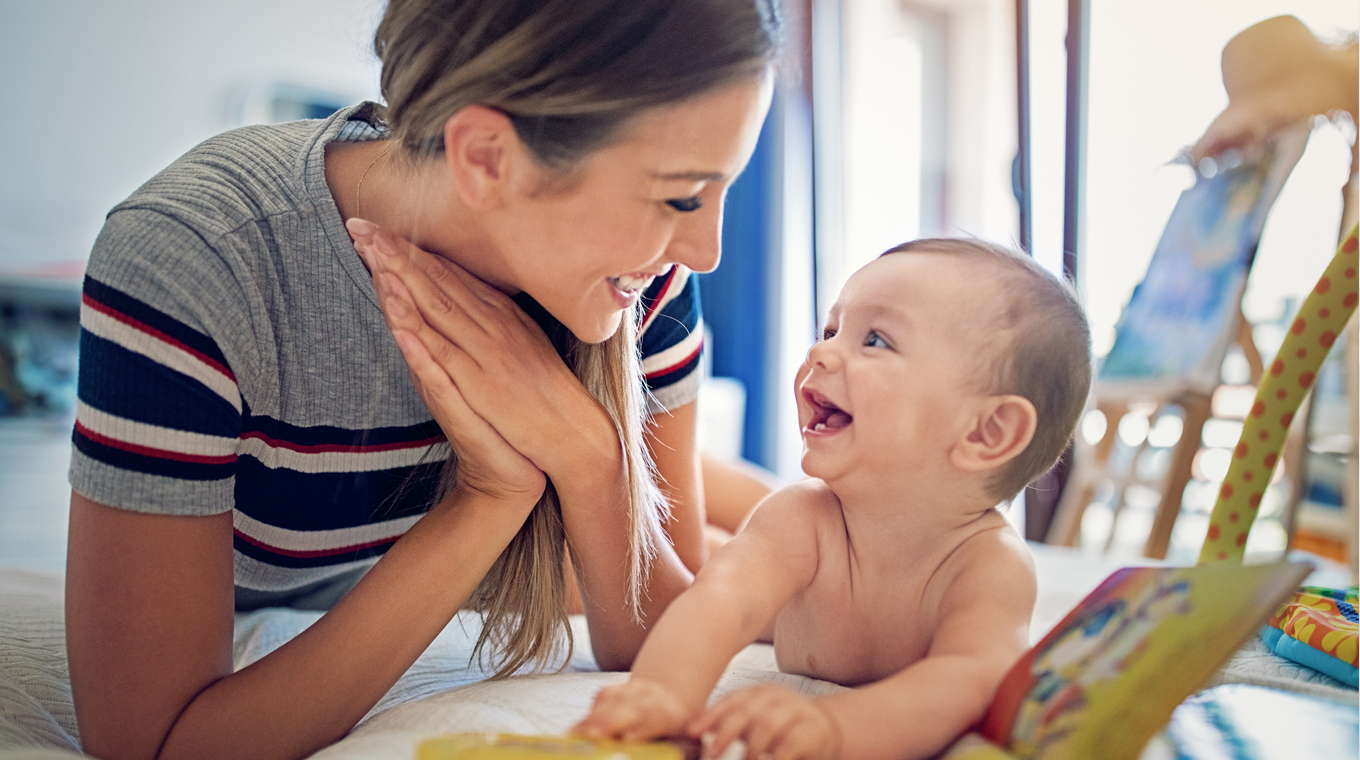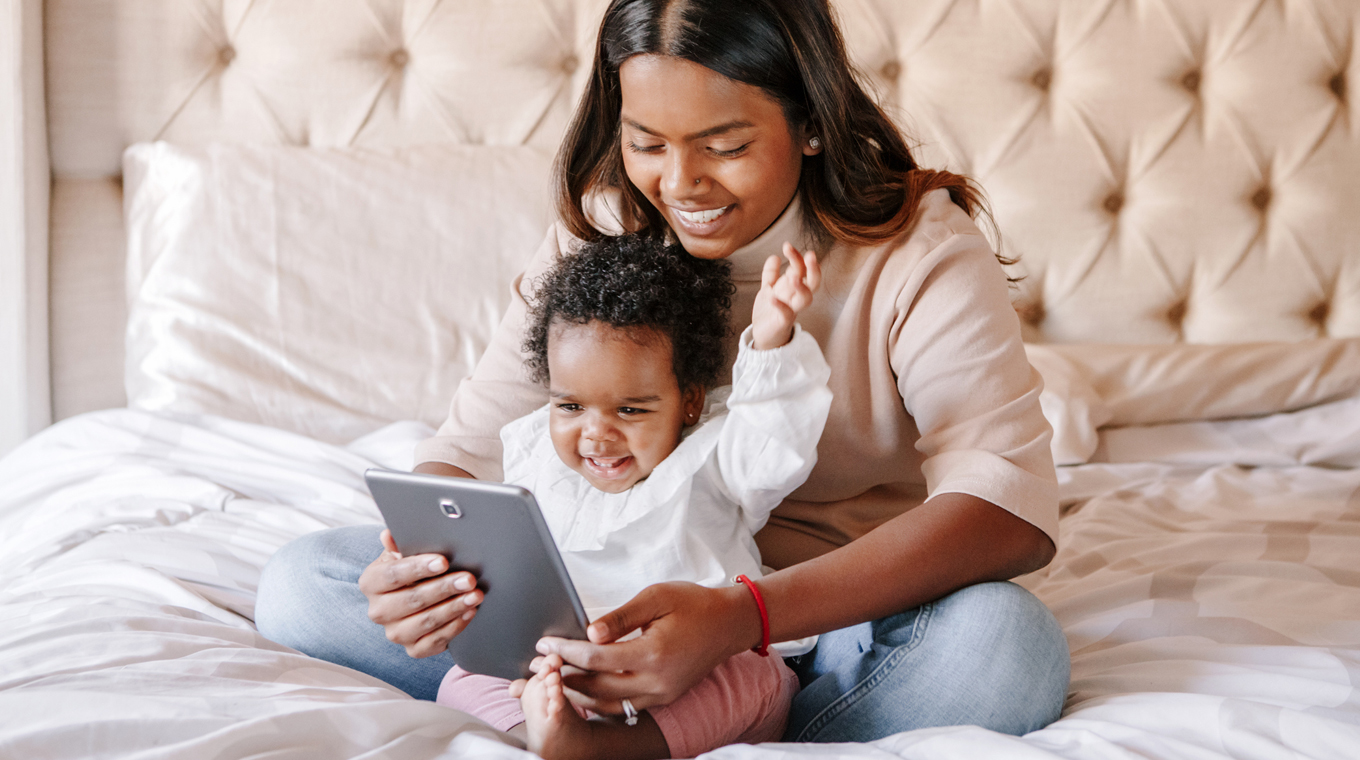
In this article
There are few greater joys than hearing your baby’s first laugh. The way they smile and giggle is adorable beyond words. Not only is it the sweetest sound you’ve ever heard, but your baby’s first laugh is one of our favorite milestones. After all, when your baby starts laughing, it’s one of the first ways they start communicating with you.
Although it isn’t necessarily the first milestone that comes to mind in your baby’s development, today we’re going to talk all about this cherished experience. Like, when should we expect to hear that first cute chuckle? If you can’t get enough of those giggles, how can you encourage your baby to laugh? And if they haven’t hit that milestone yet, when should you talk to your provider about it?
When might your baby start smiling and laughing?

Every baby has a timeline, so the exact moment each baby starts laughing will be different. But once you see your baby start to smile regularly, that first laugh won’t be far behind.
Early on in life, your baby will have the goofiest little grin for a variety of reasons, like passing gas or dozing off in a “formula/milk drunk” sleep. It also could be experimenting with their mouth muscles in general, and learning all the great things it can do.
But once they are smiling regularly and have mastered other noises, like cooing, they’ll graduate to laughing. “Generally around 3 to 5 months you might hear the first little one, and then usually a big belly laugh by 6 months,” pediatrician Jennifer Cross shared with Today.com.
How to make your baby laugh

Of course, there are some times that your baby is more likely to laugh than others, including when you intentionally try to get a giggle out of them. So do you know how to make your baby laugh? Get them to laugh and giggle by trying different noises, touches, and games with your baby.
Touches
When you’re trying to figure out how to make your baby laugh, your first instinct might be tickling. While that might make them smile and giggle when they’re a little bit older, try out a few other fun touches like blowing raspberries and gentle nose kisses.
Different Sounds
Your baby has heard your voice many, many times before, but using different pitches and tones can elicit a laugh from them. “After bath time, I used to make silly noises while getting her dressed, and she would laugh like I was the funniest human in the world,” mom of one Nakisha B. told Mom.com
Think about the different sounds you make when you sing a song like “Bingo” or “The Itsy-Bitsy Spider.” For example, hearing the swoosh noise you make when you “washed the spider out” might tickle their fancy enough to giggle.
Games
Peek-a-boo and pat-a-cake are classic baby games for a reason. If you’re ever feeling stumped about how to make your baby laugh, try playing these games with your baby. Emphasizing different words will set them apart from the rest and prompt your little one to start giggling.
Keep in mind that babies aren’t too different when it comes to older kids and adults when it comes to forcing them to laugh. If they’re tired or agitated, it doesn’t matter how much fun you try to have with them, they aren’t going to laugh.
Keeping track of baby’s developmental milestones

The time you expected your baby to start laughing has come and gone. You’ve tried everything you can think of to get your baby to laugh, but still no laughs. So what do you do next?
As we said, not only is this a sweet experience, but it is also one of your baby’s developmental milestones. Some babies are more giggly and smiley than others. So as long as your baby is meeting other developmental milestones, there is no need to be concerned. Every time your baby has a wellness exam, your doctor will ask about different developmental milestones that they’re meeting. So if you need any reassurance, the exam is a great time to ask.
On the other hand, if you notice them missing other milestones, like eye contact, making cooing noises, smiling and laughing, or recognizing people they see regularly by around 6 months of age, it’s something you should mention to their doctor at their next wellness exam.
*Disclaimer: The advice on Mom.com is not a substitute for consultation with a medical professional or treatment for a specific condition. You should not use this information to diagnose or treat a health problem without consulting a qualified professional. Please contact your health-care provider with questions and concerns.
